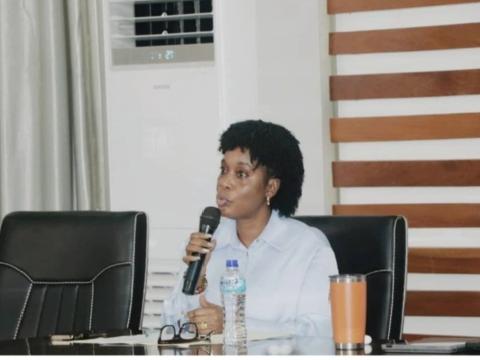By Chernor Alimamy Kamara
The Ministry of Fisheries and Marine Resources (MFMR) has vowed to improve export earnings and generate more revenue from the fisheries sector by ensuring European markets certification for value-added exportation of the country’s fish and fisheries products.
Reading the Ministry’s budget for the Fiscal Year (FY) 2025 bilateral budget discussion at the main conference room of the Ministry of Finance on the 19th of August 2024, the Head of Marine Artisanal at the ministry, Shaku Sei stated that the strategy for 2025 is financial consolidation for food security, revenue generation, job creation and human capital development. He said that the MFMR 2024 budget is strictly aligned with their Medium-Term National Development Plan (MTNDP) to diversify the ministry’s economy through sustainable fisheries management for wealth creation.
He explained that the fisheries sector's strategic objectives for 2025 to 2028 are to scale up production and industrial processing of fisheries and other marine products, to promote the Feed Salone Initiative for food and nutrition security, promote job creation to deliver the Youth Employment Scheme (YES) and human capital development among the Big Five Game Changers of the government agenda.
Sei noted that in the coming year, the ministry aims to combat Illegal, Unreported, and Unregulated fishing (IUU) by increasing fisheries patrol, increasing revenue generation through the implementation of a quota management system, and developing and promoting aquaculture at the commercial level. He also said that the ministry will construct a fish harbor and its ancillary facilities to create more wealth from the fisheries sector through effective monitoring and improved licensing scheme of Quota and total allowable catches.
He emphasized that between 2024 and 2028, the ministry’s licensing system for trawlers will be based on the quantity of fish that trawlers catch, instead of the size of the fishing vessel.
He added that the fisheries and marine resources sector is key for the delivery of the Feed Salone Initiative and presents a competitive business environment through fish production of about 200,000 (two hundred thousand) metric tons per annum.
“Over 80% of Sierra Leoneans consume fish as the main source of animal protein; with average per capita consumption around 22.6kg of fish per year. The country’s fish consumption is above the average consumption of 11.2kg for the rest of West Africa, and the global average of 20kg. The sector employs over 1,000,000 people,” he said.
The MFMR Head of Marine Artisanal confirmed that the ministry generated revenue of NLE 100 Million in 2023 and NLE 200 million in 2024 from License fees, royalties, local fish discharge, fines, transshipment, and entry clearance. He said that in FY 2024 as of July 2024, revenue of NLE 79.9 million has been generated.
“Although revenue dropped below pre-COVID levels, in 2018 and 2019, US$ 10 million and US$ 11 were generated respectively. There is the potential for generating more revenues as fisheries investment is gradually picking up in the post-COVID era,” he said.
Highlighting the ministry’s challenges for FY 2023 to 2024, Sei said that there are too many illegal fishing nets used by the people in the artisanal fisheries sector. He stated that fish feed formulation materials and technology are inadequate to promote commercial fish farming to produce over 50, 000 (fifty thousand) tons of fish from the aquaculture sector and, therefore needed more support for aquaculture extension services.
At the end of the presentation, the Head of Marine Artisanal on behalf of the MFMR requested a budget estimate of NLE 159,419.5 (one hundred and fifty-nine million, four hundred and nineteen million New Leones) to implement their projects.
The Ministry of Fisheries and Marine Resources is mandated to promote responsible fishing in Sierra Leone, throug optimized revenue generation, rational planning, management, and conservation of all living aquatic resources of the country for the benefit of present and future generations.
Copyright © 2024 Politico (21/08/24)








